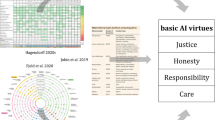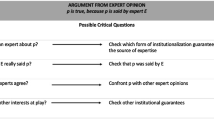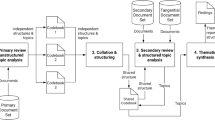Abstract
In the last few years, AI continues demonstrating its positive impact on society while sometimes with ethically questionable consequences. Building and maintaining public trust in AI has been identified as the key to successful and sustainable innovation. This chapter discusses the challenges related to operationalizing ethical AI principles and presents an integrated view that covers high-level ethical AI principles, general notion of trust/trustworthiness, and product/process support in the context of responsible AI, which helps improve both trust and trustworthiness of AI for a wider set of stakeholders.
Access this chapter
Tax calculation will be finalised at checkout
Purchases are for personal use only
Similar content being viewed by others
Notes
- 1.
Law is usually considered to set the minimum standards of behavior while ethics sets the maximum standards so we will use the word "ethics" throughout the chapter.
- 2.
- 3.
General Data Protection Regulation, https://gdpr-info.eu/.
References
Crawford, K.: The hidden costs of ai. New Scientist 249(3327), 46–49 (2021)
CDEI: Review into bias in algorithmic decision making. https://www.gov.uk/government/publications/cdei-publishes-review-into-bias-in-algorithmic-decision-making/main-report-cdei-review-into-bias-in-algorithmic-decision-making (2020). Accessed on 16 December 2020
Dignum, V.: Responsible Artificial Intelligence: How to Develop and Use AI in a Responsible Way. Springer International Publishing (2019)
Jobin, A., Ienca, M., Vayena, E.: The global landscape of ai ethics guidelines. Nature Machine Intelligence 1(9), 389–399 (2019)
Fjeld, J., Achten, N., Hilligoss, H., Nagy, A., Srikumar, M.: Principled artificial intelligence: Mapping consensus in ethical and rights-based approaches to principles for ai. Berkman Klein Center Research Publication (2020-1) (2020)
Mittelstadt, B.: Principles alone cannot guarantee ethical ai. Nature Machine Intelligence 1(11), 501–507 (2019). DOI 10.1038/s42256-019-0114-4
Hidalgo, C.A., Orghiain, D., Canals, J.A., De Almeida, F., Martín, N.: How Humans Judge Machines. MIT Press (2020)
Lockey, S., Gillespie, N., Curtis, C.: Trust in artificial intelligence: Australian insights. https://home.kpmg/au/en/home/insights/2020/10/artificial-intelligence-trust-ai.html (2020). DOI 10.14264/b32f129. Accessed on 16 December 2020
Miller, T.: Explanation in artificial intelligence: Insights from the social sciences. Artificial Intelligence 267, 1 – 38 (2019). https://doi.org/10.1016/j.artint.2018.07.007. http://www.sciencedirect.com/science/article/pii/S0004370218305988
Shneiderman, B.: Bridging the gap between ethics and practice: Guidelines for reliable, safe, and trustworthy human-centered ai systems. ACM Trans. Interact. Intell. Syst. 10(4) (2020). DOI 10.1145/3419764. https://doi.org/10.1145/3419764
Ji, Z., Lipton, Z.C., Elkan, C.: Differential privacy and machine learning: a survey and review (2014)
Mehrabi, N., Morstatter, F., Saxena, N., Lerman, K., Galstyan, A.: A survey on bias and fairness in machine learning (2019)
Dong, M., Yuan, F., Yao, L., Wang, X., Xu, X., Zhu, L.: Survey for trust-aware recommender systems: A deep learning perspective (2020)
Perera, H., Hussain, W., Whittle, J., Nurwidyantoro, A., Mougouei, D., Shams, R.A., Oliver, G.: A study on the prevalence of human values in software engineering publications, 2015 – 2018. In: Proceedings of the ACM/IEEE 42nd International Conference on Software Engineering, ICSE ’20, p. 409–420. Association for Computing Machinery, New York, NY, USA (2020). DOI 10.1145/3377811.3380393. https://doi.org/10.1145/3377811.3380393
Hussain, W., Perera, H., Whittle, J., Nurwidyantoro, A., Hoda, R., Shams, R.A., Oliver, G.: Human values in software engineering: Contrasting case studies of practice. IEEE Transactions on Software Engineering pp. 1–1 (2020). https://doi.org/10.1109/TSE.2020.3038802
Hutchinson, B., Smart, A., Hanna, A., Denton, E., Greer, C., Kjartansson, O., Barnes, P., Mitchell, M.: Towards accountability for machine learning datasets: Practices from software engineering and infrastructure (2020)
van den Hoven, J., Vermaas, P.E., van de Poel, I.: Design for values: An introduction. In: J. van den Hoven, P.E. Vermaas, I. van de Poel (eds.) Handbook of Ethics, Values, and Technological Design: Sources, Theory, Values and Application Domains, pp. 1–7. Springer Netherlands, Dordrecht (2015)
Ferrario, M.A., Simm, W., Forshaw, S., Gradinar, A., Smith, M.T., Smith, I.: Values-first se: Research principles in practice. In: 2016 IEEE/ACM 38th International Conference on Software Engineering Companion (ICSE-C), pp. 553–562 (2016)
Thew, S., Sutcliffe, A.: Value-based requirements engineering: Method and experience. Requirements Engineering 23(4), 443–464 (2018). DOI 10.1007/s00766-017-0273-y. https://doi.org/10.1007/s00766-017-0273-y
Chia, S.Y., Xu, X., Paik, H.Y., Zhu, L.: Analysing and extending privacy patterns with architectural context. In: Proceedings of the 36th Annual ACM Symposium on Applied Computing. Association for Computing Machinery, Virtual Event , Republic of Korea (2021)
Lo, S.K., Lu, Q., Wang, C., Paik, H.Y., Zhu, L.: A systematic literature review on federated machine learning: From a software engineering perspective (2020)
Zhang, W., Lu, Q., Yu, Q., Li, Z., Liu, Y., Lo, S.K., Chen, S., Xu, X., Zhu, L.: Blockchain-based federated learning for device failure detection in industrial iot. IEEE Internet of Things Journal pp. 1–1 (2020). DOI 10.1109/JIOT.2020.3032544
Mougouei, D., Perera, H., Hussain, W., Shams, R., Whittle, J.: Operationalizing human values in software: A research roadmap. In: Proceedings of the 2018 26th ACM Joint Meeting on European Software Engineering Conference and Symposium on the Foundations of Software Engineering, ESEC/FSE 2018, p. 780–784. Association for Computing Machinery, New York, NY, USA (2018)
IEEE SA: Ethically aligned design: A vision for prioritizing human well-being with autonomous and intelligent systems. https://standards.ieee.org/content/ieee-standards/en/industry-connections/ec/ autonomous-systems.html (2019). Accessed on 16 December 2020
DISER: Australia’s ai ethics principles. https://industry.gov.au/data-and-publications/building-australias-artificial-intelligence-capability/ai-ethics-framework/ai-ethics-principles (2020). Accessed on 16 December 2020
Staples, M., Zhu, L., Grundy, J.: Continuous validation for data analytics systems. In: Proceedings of the 38th International Conference on Software Engineering Companion, ICSE ’16, p. 769–772. Association for Computing Machinery, New York, NY, USA (2016). DOI 10.1145/2889160.2889207. https://doi.org/10.1145/2889160.2889207
D’Amour, A., Heller, K., Moldovan, D., Adlam, B., Alipanahi, B., Beutel, A., Chen, C., Deaton, J., Eisenstein, J., Hoffman, M.D., Hormozdiari, F., Houlsby, N., Hou, S., Jerfel, G., Karthikesalingam, A., Lucic, M., Ma, Y., McLean, C., Mincu, D., Mitani, A., Montanari, A., Nado, Z., Natarajan, V., Nielson, C., Osborne, T.F., Raman, R., Ramasamy, K., Sayres, R., Schrouff, J., Seneviratne, M., Sequeira, S., Suresh, H., Veitch, V., Vladymyrov, M., Wang, X., Webster, K., Yadlowsky, S., Yun, T., Zhai, X., Sculley, D.: Underspecification presents challenges for credibility in modern machine learning (2020)
Bauer, P.C.: Conceptualizing trust and trustworthiness (2019)
Holzinger, A., Langs, G., Denk, H., Zatloukal, K., Müller, H.: Causability and explainability of artificial intelligence in medicine. Wiley Interdisciplinary Reviews: Data Mining and Knowledge Discovery 9(4), e1312 (2019)
ISO: Iso/iec25010:2011 systems and software engineering–systems and software quality requirements and evaluation (square)–system and software quality models. International Organization for Standardization 34, 2910 (2011)
Avizienis, A., Laprie, J.C., Randell, B., Landwehr, C.: Basic concepts and taxonomy of dependable and secure computing. IEEE Trans. Dependable Secur. Comput. 1(1), 11–33 (2004). DOI 10.1109/TDSC.2004.2. https://doi.org/10.1109/TDSC.2004.2
Bass, L., Clements, P., Kazman, R.: Software architecture in practice. Addison-Wesley Professional (2003)
Whittle, J.: Is your software valueless? IEEE Software 36(3), 112–115 (2019). DOI 10.1109/MS.2019.2897397
Kearns, M., Roth, A.: The Ethical Algorithm: The Science of Socially Aware Algorithm Design. Oxford University Press USA (2019)
Blackman, R.: A practical guide to building ethical ai. https://hbr.org/2020/10/a-practical-guide-to-building-ethical-ai (2020). Accessed on 16 December 2020
European Commission: The digital services act package. https://ec.europa.eu/digital-single-market/en/digital-services-act-package (2020). Accessed on 16 December 2020
Australian Government Department of Health: Regulation of software based medical devices. https://www.tga.gov.au/regulation-software-based-medical-devices (2021). Accessed on 11 April 2021
Gilpin, L.H., Bau, D., Yuan, B.Z., Bajwa, A., Specter, M., Kagal, L.: Explaining explanations: An overview of interpretability of machine learning. In: 2018 IEEE 5th International Conference on Data Science and Advanced Analytics (DSAA), pp. 80–89 (2018). DOI 10.1109/DSAA.2018.00018
Author information
Authors and Affiliations
Corresponding author
Editor information
Editors and Affiliations
Rights and permissions
Copyright information
© 2022 The Author(s), under exclusive license to Springer Nature Switzerland AG
About this chapter
Cite this chapter
Zhu, L., Xu, X., Lu, Q., Governatori, G., Whittle, J. (2022). AI and Ethics—Operationalizing Responsible AI. In: Chen, F., Zhou, J. (eds) Humanity Driven AI. Springer, Cham. https://doi.org/10.1007/978-3-030-72188-6_2
Download citation
DOI: https://doi.org/10.1007/978-3-030-72188-6_2
Published:
Publisher Name: Springer, Cham
Print ISBN: 978-3-030-72187-9
Online ISBN: 978-3-030-72188-6
eBook Packages: Computer ScienceComputer Science (R0)




